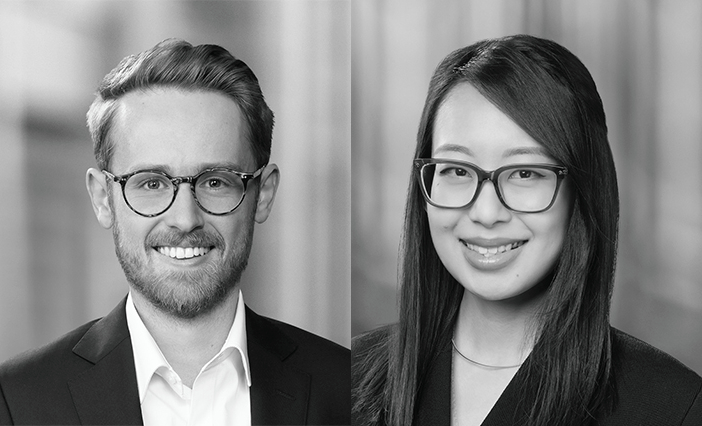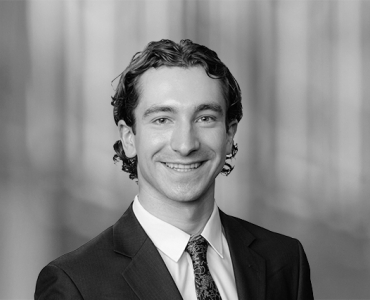
May 2024: Melbourne senior associates Barnaby Matthews and SuZanne Yap are part of our highly regarded Project Development and Project Finance practices. They explain what it's like to work in their friendly, busy and challenging teams, and why now is a great time to join.
Tell us about your practices?
SuZanne Yap: On the Project Finance side, we assist developers of large-scale energy and infrastructure projects (known as the Project Sponsors) and their financiers, in all aspects of obtaining funds for the development, construction and operation of their projects. These projects range from roads and rail, to wind farms and solar farms, to battery and hydro storage, as well as exploring new fields such as green hydrogen and biofuels.
Barnaby Matthews: On the Project Development side, we focus on delivery. We assist the Project Sponsors in all aspects of developing their projects (including development, construction, operation and maintenance). We work closely with the Project Finance team when it comes to due diligence and financing.
What's most exciting about what you do?
BM: We are constantly at the forefront of the market, working on leading transactions with innovative structures and approaches.
SY: Due to the experience and reputation of the Project Finance and Project Development partners in the Firm, clients often come to White & Case for the more complex, or "first-of-its-kind" projects; meaning that the work we do is often new and unprecedented. You get to develop your skills and expertise, but it never feels mundane or repetitive.
BM: The renewable energy space is constantly changing and developing, and there's always something new to learn and get involved in.
SY: It also feels good morally that we're driving positive change toward a sustainable future by facilitating the development and financing of innovative, clean energy projects that have a lasting positive impact on our planet and society.
For an ambitious associate, why is now a good time to join this team?
SY: There aren't a lot of (if any) other firms in Australia that have a Tier 1 Project Finance practice that are also in the growth stage, so there is a lot of room to grow, learn and progress here. The partners in the team are at the top of their fields, so they are great people to learn from. Equally, because of their status and experience, clients trust us with their most complex and market-leading projects, which makes for interesting work and a lot of opportunity to shine.
BM: We are a market-leading energy transition team, and the energy transition is one of the most exciting and growing spaces in the market. Being part of a genuinely integrated global firm also gives you the opportunity to work on interesting deals across the worldŌĆöI've recently been involved in deals in Europe, Asia-Pacific and the Middle East.
How much client contact and responsibility do you get as an associate?
SY: A lot. Lawyers are given a lot of client contact and opportunity, even at a junior level. In this team, that means liaising directly with clients in relation to finance documentation and attending negotiations, and as a mid-level/senior, it means being the primary contact for a deal and coordinating the matter.
BM: At all levels, you will have the opportunity to get involved in interesting and bespoke drafting and negotiation. There's plenty of opportunities to stretch yourself by managing and facilitating client relationships from an early stage, but also under the cover of extremely experienced and well-regarded partners.
How many matters might an associate typically deal with at one time?
SY: It depends on two things reallyŌĆöthe size of the matter(s), and the level of seniority. If there is a particularly complex and sizable matter, it's entirely possible to be working on that matter exclusively. At the same time, I've found that the number of matters I work on at any one time has increased progressively with experience. As a junior associate, you might work on two matters concurrently, but as a senior, that number might come up to about four or five.
BM: It could be one big one or ten small ones, or anywhere in between. Often our projects will take years to develop, and so you might have a few things on the backburner that pop up every now and then, as well as matters that hit a critical deal point (such as financing) where it's all-hands-on-deck.
How does mentorship work in your team?
BM: There are numerous formal mentoring and feedback processesŌĆöbut equally, having a friendly and non-hierarchical culture facilitates more organic feedback and mentoring opportunities.
SY: While we do have formal processes and programs for mentorship and an annual feedback regime, every partner at the Firm is open and willing to provide mentorship in a less structured way, and to give constructive feedback after completion of a task or a deal. I personally have two mentors, one in the Project Finance team, and one from a different team, which I think helps with offering a different perspective.
Finally, what's the workplace culture like?
SY: This is a very social team. We often have planned activities and dinners, but we will just as often go for a team lunch on a whim when one of the partners says, "Burger Fridays, anyone?"
BM: Our workplace is genuinely a friendly and collegiate place. My colleagues are my favorite part of my job.





